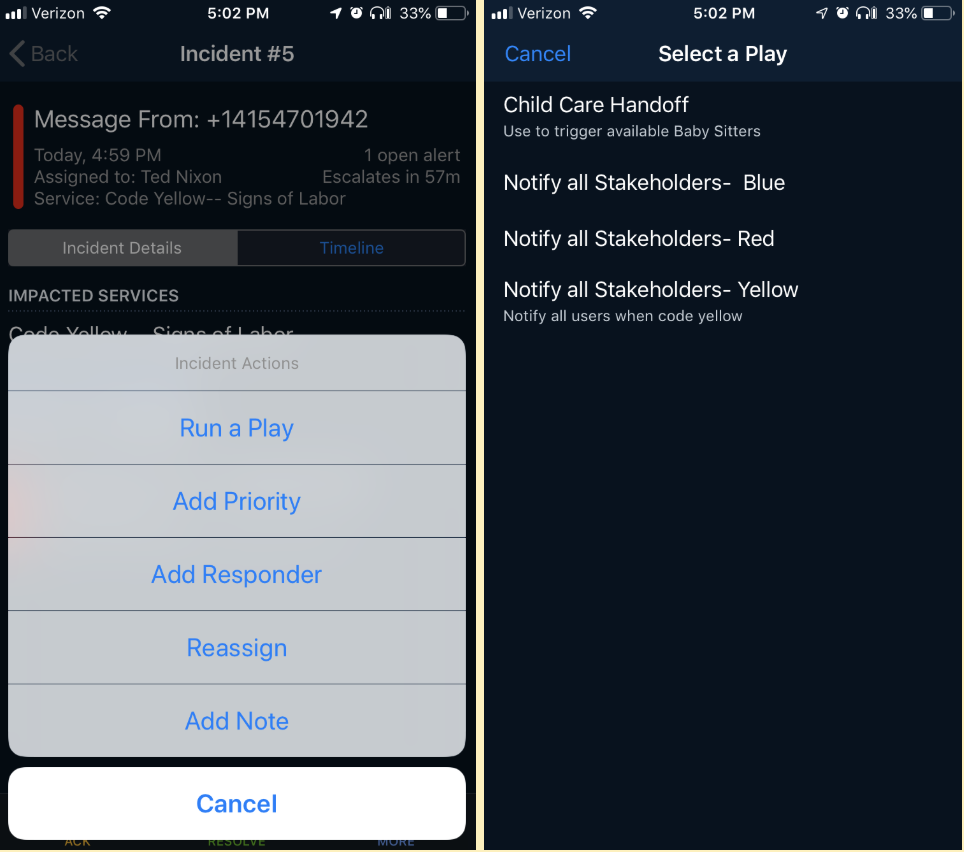- PagerDuty /
- Blog /
- Use Cases & Solutions /
- LaborDuty: Incident Response for Baby’s Arrival
Blog
LaborDuty: Incident Response for Baby’s Arrival
Real-time operations is a term PagerDuty uses to describe the process in which people can acknowledge, communicate, resolve, and learn from impactful events—all in real time. What can be a more impactful and real time than the miracle of childbirth? Whether it’s your first or fifth child, things don’t always go as planned, but the experience also generally comes with a good story filled with hindsight. It isn’t too different than the major incidents our customers manage every day.
With Father’s Day weekend coming up in a couple of days, I got to reminiscing about what happened when my wife and I were preparing for our third kid. After our first two kids arrived several days after their due dates, we had no issue procrastinating on the “action plan” for the third. After all, with four weeks until the projected due date, we still had time—plus we had other stuff to worry about since we had just moved to the suburbs of Walnut Creek, California, which meant my commute increased to an average of 90 minutes each way.
However, not more than a week after our move, my wife experienced an episode of false contractions. For those unfamiliar with false contractions, they can sometimes be minor and, at other times, they can as painful as real labor. These contractions were the latter and they had me scrambling. We had no “go bag” prepared, nobody was available to take care of the other two kids, and I may not have had enough gas in the tank to get us to the hospital.
Now, before you crown me “dad and husband of the year,” the fire drill gave me an opportunity to redeem myself. A few hours later, we confirmed it was a false alarm. Even so, at this point, I had the go-bag packed, the gas tanks filled, and an upcoming business trip canceled.
That sleep-deprived evening also left me with several questions:
- During the business day, how can I get alerted when the real alarm hits?
- I work in San Francisco, which is 1-2 hours away on a good commute day. Who can help drive my wife or meet her at the hospital when the contractions are real and I can’t get there fast enough?
- All of our close friends and family are on vacation at various times throughout the summer. Who can take care of the kids while we are in the delivery room?
- How can we notify all close friends and family members of what’s happening?
As it so happens, I sell a software platform that automates incident response: PagerDuty. Since I couldn’t sleep that night anyway, I took the opportunity to build a PagerDuty instance that would automate a series of actions that would solve for the above while making it really easy for my wife to use.
I went from under-prepared to exceedingly over-prepared in under 24 hours. There were no more false contractions, but the real thing happened a week later, right after I got home from the office. Thanks to our preparation, Baby Z (his gender neutral name at the time), was delivered healthy and happy two weeks before his due date, with his parents in full control of the situation.
Setting Up the LaborDuty PagerDuty Instance
For all you expectant parents and future expectant parents, I’ve detailed the functions below with screenshots so you can use this as the incident response platform for your baby’s arrival (or simply use it to impress your partner to make up for previous mistakes).
1. Alert me based on my partner’s condition.
I created a series of three services based on the “threat level.” Being in the medical field, my wife wanted me to use code words that would indicate the urgency of the incident: Codes Blue, Red, and Yellow.

2. If I didn’t respond, an escalation policy is automatically triggered, alerting available family members or friends to meet my partner at the hospital (or drive her if applicable).
After building a schedule of vacations for each family member, I added escalation policies for each service, with codes Red and Blue being of a higher urgency.

3. Automatically update all friends and family members.
Using PagerDuty’s Response Plays, I was able to set up automatic notifications for all family members depending on which service was triggered. This was done through the Subscriber Notifications function. Both of these features are part of the Modern Incident Response package.

4. Create an action that would alert for available childcare providers through one button.
With Response Plays, my wife and I could quickly initiate an escalation policy that included family, friends, and babysitters who are on call to take care of our kids during the delivery—all by tapping “Run a Play” in the PagerDuty mobile app.

5. Make it easy for my partner to trigger the process.
The process would be initiated by using PagerDuty’s Live Call Routing, which would allow my wife to call a phone number stored in her phone. When called, one of the three scenarios described in step 1 would automatically be triggered, saving time (and some sanity) by not having to manually trigger an incident or send an email.


In the end, we wound up never using the PagerDuty instance as our new baby was considerate to our schedule. I was home and our closest family members just got off work to meet us at the hospital. However, I hope this story and PagerDuty configuration can provide some peace of mind to newly expecting parents looking to streamline critical actions when it’s “go time”—especially when it usually never happens at the right time.


